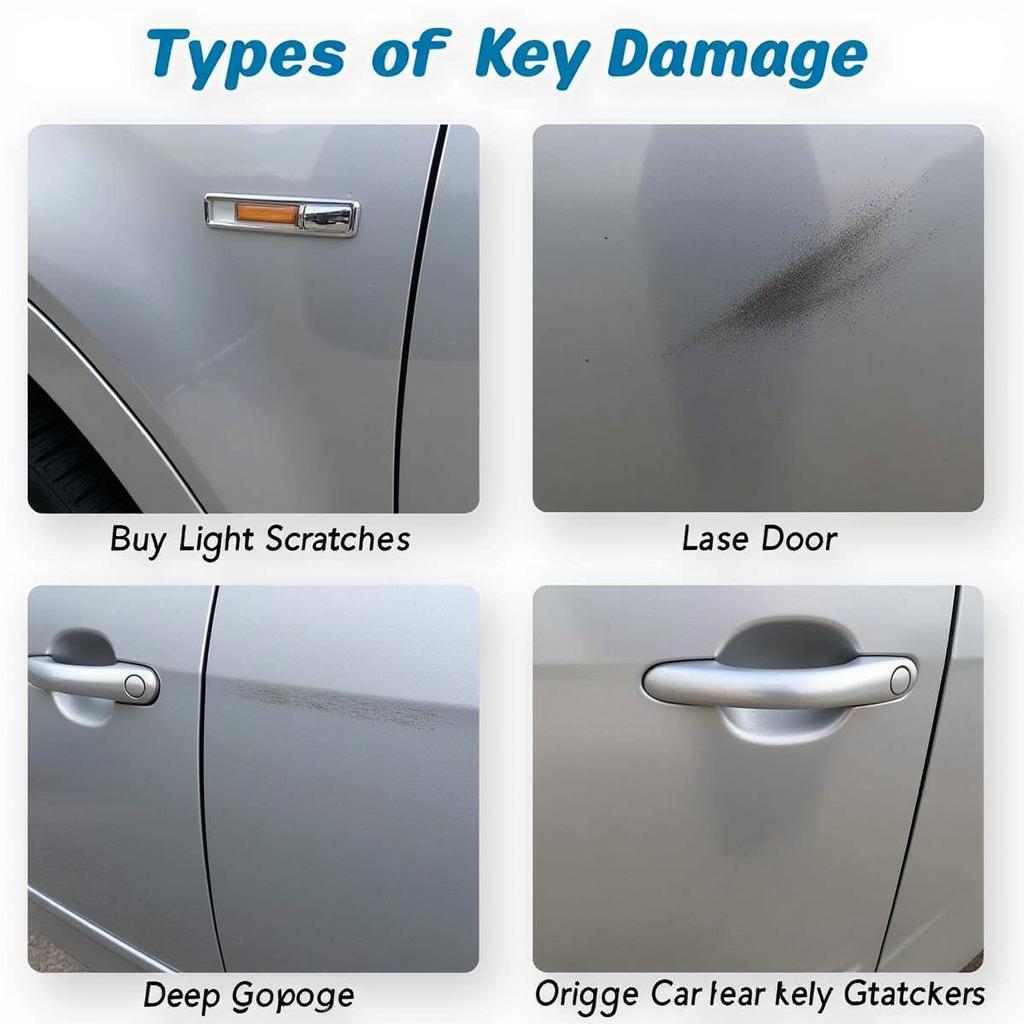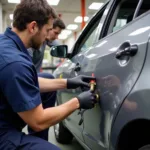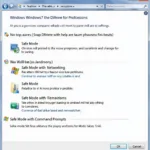Dealing with a keyed car is a frustrating experience. Whether it’s a minor scratch or a deep gouge, knowing how to repair a keyed car can save you time and money. This guide provides a step-by-step approach to assessing the damage and choosing the best repair method.
Repairing a keyed car involves several steps, from assessing the damage to applying the final touches. The right approach depends on the severity of the keying. Minor scratches might only require a good polish, while deeper gouges necessitate more intensive methods like touch-up paint or professional repair. Let’s delve into the specifics.
Assessing the Damage: Knowing Your Enemy
Before you start any repair, it’s crucial to thoroughly examine the keyed area. Is it a light scratch that disappears with the swipe of a finger? Or is it a deep groove that’s etched into the paint? This assessment determines the best course of action. A shallow scratch might be buffed out with a rubbing compound, while a deep one requires car keyed scratch repair.
Types of Key Damage
Keying damage can range from superficial clear coat scratches to deep gouges that expose the metal underneath. Understanding the different types of damage helps you choose the appropriate repair method.
- Clear Coat Scratches: These are the easiest to fix, often requiring just a polishing compound.
- Paint Scratches: These are deeper than clear coat scratches and require touch-up paint or a professional car keyed repair dublin if you are in the area.
- Deep Gouges: These penetrate the primer and sometimes even the metal, requiring professional repair.
 Assessing Keyed Car Damage
Assessing Keyed Car Damage
DIY Repair for Minor Scratches
Minor scratches can often be repaired at home with a few simple tools and materials. This can save you the cost of a professional repair.
Materials You’ll Need:
- Rubbing compound
- Polishing compound
- Microfiber cloths
- Car wash soap and water
Steps for Repairing Minor Scratches:
- Wash the affected area thoroughly.
- Apply a small amount of rubbing compound to a microfiber cloth.
- Rub the compound onto the scratch using circular motions.
- Wipe away the excess compound with a clean microfiber cloth.
- Apply polishing compound to further refine the finish.
- Finish with a coat of wax for added protection.
When to Call a Professional
While minor scratches can be handled with DIY methods, deeper damage requires professional expertise. If the keying has gone through the paint to the primer or metal, it’s best to seek professional repair keyed cars. Attempting to repair such deep damage yourself could worsen the problem.
Benefits of Professional Repair
- Color Matching: Professionals have the tools and expertise to perfectly match the paint color to your car.
- Preventing Rust: Deep gouges can expose the metal, making it susceptible to rust. Professionals can properly seal the area to prevent this.
- Resale Value: A professional repair can help maintain the resale value of your car.
“When dealing with a keyed car, the first step is always a thorough assessment. This helps determine the best course of action, whether it’s a DIY fix or professional repair,” advises John Smith, Senior Auto Body Technician at Smith Auto Repairs.
Preventing Future Keying Incidents
While you can’t always prevent vandalism, there are steps you can take to minimize the risk.
- Parking in Well-Lit Areas: This can deter potential vandals.
- Installing Security Cameras: Cameras can act as a deterrent and provide evidence if keying does occur.
- Parking in a Garage: This offers the best protection for your vehicle.
Knowing [how to repair a keyed car door](https://carrepairon.com/how to repair a keyed car door/) can empower you to take action and restore your car’s appearance.
Conclusion
How to repair a keyed car depends heavily on the depth and extent of the damage. While DIY methods work well for minor scratches, deeper gouges require the expertise of a professional. By accurately assessing the damage and choosing the appropriate repair method, you can restore your car’s appearance and maintain its value.
“Remember, prevention is always better than cure. Taking preventative measures can significantly reduce the risk of your car being keyed in the first place,” adds Sarah Jones, Security Consultant at Secure Parking Solutions.
FAQ
- Can I use toothpaste to repair a keyed car? Toothpaste is not a suitable repair method and can actually damage the paint further.
- How much does it cost to professionally repair a keyed car? The cost varies depending on the severity of the damage and the location.
- Can I claim insurance for a keyed car? Yes, you can usually claim insurance, but it might affect your premiums.
- How long does it take to repair a keyed car? The repair time varies depending on the damage. Minor scratches can be repaired in a few hours, while deeper damage might take a few days.
- What type of paint should I use for touch-up repairs? Use automotive touch-up paint specifically designed for your car’s make and model.
If you need further assistance, feel free to contact us via WhatsApp: +1(641)206-8880, or Email: [email protected]. We have a 24/7 customer support team ready to help.


